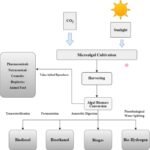Konstanz, Germany.- Within the framework of the “Biorefineries Technology Initiative” of the Federal Ministry of Education and Research, Professor Stefan Mecking from the Department of Chemistry at the University of Konstanz is launching a new project that explores the potential use of microalgae as a feedstock for chemicals. The Konstanz project aims to set up an innovative biorefining process for the production of essential platform chemicals and thus contributes to basic research in this field. The project will be funded over three years to the tune of € 917,000.
In the context of the development and study of renewable raw materials, algae have long been recognized to possess high potential. They require a relatively limited land area, their cultivation does not compete with food production and they are also comparatively undemanding as far as water quality is concerned. However, their efficient growth and processing remains a challenge. A particular problem in this context is the extraction of the substances needed for subsequent chemical conversion and ultimately their availability for industrial purposes. “This is precisely where our project comes in,” explains Professor Stefan Mecking. “We want to simplify the overall process by integrating the extraction stage as far as possible with the following chemical conversion stages in which those products are manufactured which are actually needed.” The team of researchers from the University of Konstanz, which will work together on this project, plans to extract the algae in a simple and eco-friendly process with the help of supercritical carbon dioxide. “It is well established that the required lipids can be extracted from the algae with this solvent, which is also used, for example, in the decaffeinating of coffee,” Stefan Mecking continues. The special task in his project will be to implement the subsequent catalytic steps directly in this solvent as well.
The current project, for which the Federal Ministry of Education and Research has awarded funding, goes back to a research collaboration with the group of Professor Peter Kroth of the Department of Biology at the University of Konstanz. The aim is to demonstrate the concept of the integrated biorefining process on a laboratory scale during the course of the project. If this succeeds in showing that through the sequence of selected catalytic reactions in the integrative process the full spectrum of chemical building blocks used today can be produced from algae, the approach could move forward towards practice. Further development in collaboration with industry would be the next step.
Key facts:
– Project funding for Konstanz chemist Professor Stefan Mecking for innovative refinery concept for microalgae lipids.
– Funding period: December 2018 to December 2021. Funding: € 917,000. Funding line: “Biorefineries Technology Initiative” of the Federal Ministry of Education and Research.
– Innovative biorefinery concept aims to produce chemical building blocks from microalgae through a catalytic process. This is integrated with the microalgae extraction process.
– Process uses carbon dioxide as eco-friendly solvent.
Stay Always Informed
Join our communities to instantly receive the most important news, reports, and analysis from the aquaculture industry.
Source: University of Konstanz
Editor at the digital magazine AquaHoy. He holds a degree in Aquaculture Biology from the National University of Santa (UNS) and a Master’s degree in Science and Innovation Management from the Polytechnic University of Valencia, with postgraduate diplomas in Business Innovation and Innovation Management. He possesses extensive experience in the aquaculture and fisheries sector, having led the Fisheries Innovation Unit of the National Program for Innovation in Fisheries and Aquaculture (PNIPA). He has served as a senior consultant in technology watch, an innovation project formulator and advisor, and a lecturer at UNS. He is a member of the Peruvian College of Biologists and was recognized by the World Aquaculture Society (WAS) in 2016 for his contribution to aquaculture.







